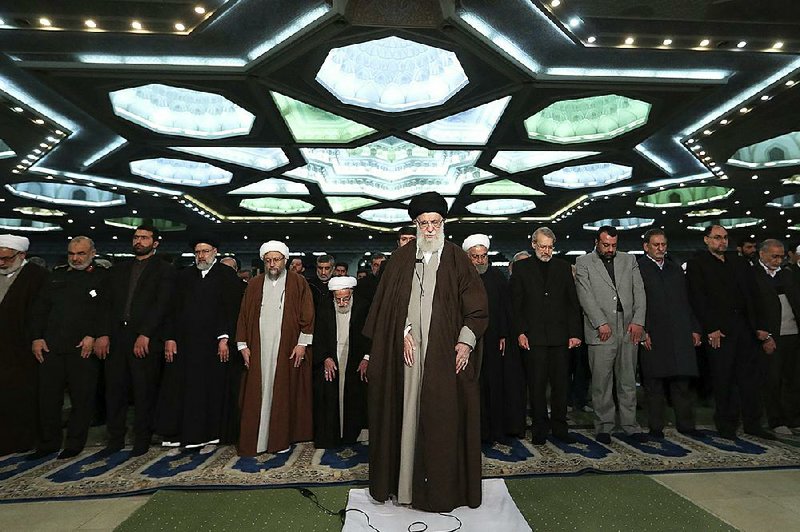TEHRAN, Iran -- Iran's supreme leader criticized Western countries as he led Friday prayers in Tehran for the first time in eight years, dismissing "American clowns" who he said pretend to support the Iranian nation but want to stick their "poisoned dagger" into its back.
Ayatollah Ali Khamenei used his rare appearance at the weekly prayers to deliver a fiery address in which he insisted Iran would not bow to U.S. pressure after months of crushing sanctions and a series of recent crises -- from the killing of a top Iranian general to the accidental shoot-down of a Ukrainian passenger plane.
Khamenei said the mass funerals for Gen. Qassem Soleimani, who was killed in a U.S. airstrike earlier this month, show that the Iranian people support the Islamic Republic despite its recent trials. He said the "cowardly" hit on Soleimani had taken out the most effective commander in the battle against the Islamic State group.
In response to Soleimani's killing, Iran fired a barrage of ballistic missiles targeting U.S. troops in Iraq, without causing serious injuries. Khamenei said the strike had dealt a "blow to America's image" as a superpower. In the part of his sermon delivered in Arabic, he said the "real punishment" would be in forcing the U.S. to withdraw from the Middle East.
[Video not showing up above? Click here to watch » https://www.youtube.com/watch?v=OlECMQv8Ig8]
Meanwhile, U.S. defense officials said Thursday that 11 U.S. troops were wounded in the Jan. 8 Iranian strikes on a base in Iraq, despite initial reports to the contrary.
Those troops are still being assessed for concussion symptoms after the blasts, Navy Capt. Bill Urban, a spokesman for U.S. Central Command, said in a statement. Eight U.S. troops were evacuated to an American base in Germany, he said, and the other three were sent to Camp Arifjan in Kuwait.
The missile barrage last week against the sprawling Ain al-Asad air base in western Iraq left deep craters and the crumpled wreckage of living quarters and a helicopter launch site. At least two soldiers were thrown through the window of a tower.
U.S. officials disclosed numerous concussions as early as Monday but did not announce their severity or the evacuations until Defense One, a news website focusing on national security, reported those details. At least two dozen personnel were treated for concussions at the base, a U.S. official said.
The acknowledgment is a departure from initial reports from defense officials and the president, who described as inconsequential the effects of the missile salvos.
In the aftermath of the attack, Army Lt. Col. Tim Garland said he had pored over the damage assessments with skepticism, believing it was impossible that no soldiers had been killed.
"We all know that the initial report is always somewhat inaccurate ... . I personally almost lost two of my soldiers," Garland told reporters at the base, describing how a blast as far as 50 yards from their position blew them out of a guard tower.
"How they survived that, I have no idea. It's an absolute miracle," he said. The base hosts about 2,000 troops, 1,500 of them from the U.S.-led coalition.
After the missile strike, as Iran's Revolutionary Guard expected an American counterattack that never came, it mistakenly shot down a Ukrainian jetliner shortly after takeoff from Tehran's international airport, killing all 176 people on board, mostly Iranians.
Authorities concealed their role in the tragedy for three days, initially blaming the crash on a technical problem. When it came, their admission of responsibility triggered days of street protests, which security forces dispersed with live ammunition and tear gas.
Ukrainian Foreign Minister Vadym Prystaiko said Friday that his country wants Iran to issue a formal document admitting its guilt. Ukraine, Canada and other nations whose citizens died in the crash have demanded Iran pay compensation to the victims' families.
Khamenei also attacked Britain, France and Germany after they triggered a dispute mechanism to try to bring Iran back into compliance with the unraveling 2015 nuclear agreement. Iran began openly breaching certain limits under the agreement last summer. After the killing of Soleimani, Iran said that it was no longer bound by the nuclear deal.
Thousands of people attended the Friday prayers, occasionally interrupting his speech by chanting "God is greatest!" and "Death to America!"
Information for this article was contributed by Amir Vahdat, Joseph Krauss and Bassem Mroue of The Associated Press; and by Louisa Loveluck and Alex Horton of The Washington Post.
A Section on 01/18/2020
